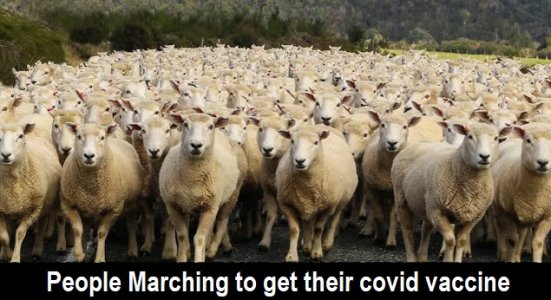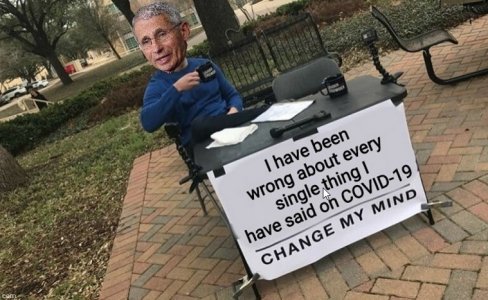Proceed at your own risk: this article (excerpts) wasn't written by Tucker Carlson or your conspiracy-guzzling neighbor. It was published by Johns Hopkins Bloomberg School of Public Health on 4-6-21. 
"When the coronavirus that causes COVID-19 first started to spread, virtually nobody was immune. Meeting no resistance, the virus spread quickly across communities. Stopping it will require a significant percentage of people to be immune. But how can we get to that point? How is the race on to get people immune by vaccinating them before they get infected?
When most of a population is immune to an infectious disease, this provides herd immunity to the disease. For example, if 80% of a population is immune to a virus, four out of every five people who encounter someone with the disease won’t get sick (and won’t spread the disease any further). In this way, the spread of infectious diseases is kept under control. Depending how contagious an infection is, usually 50% to 90% of a population needs immunity before infection rates start to decline. The higher the level of immunity, the larger the benefit. This is why it is important to get as many people as possible vaccinated.
As with any other infection, there are two ways to achieve herd immunity: A large proportion of the population either gets infected or gets a protective vaccine. What we know about coronavirus so far suggests that, if we were really to go back to a pre-pandemic lifestyle, we would need at least 70% of the population to be immune to keep the rate of infection down (“achieve herd immunity”) without restrictions on activities. But this level depends on many factors, including the infectiousness of the virus (variants can evolve that are more infectious) and how people interact with each other.
For example, when the population reduces their level of interaction (through distancing, wearing masks, etc.), infection rates slow down. But as society opens up more broadly and the virus mutates to become more contagious, infection rates will go up again. Since we are not currently at a level of protection that can allow life to return to normal without seeing another spike in cases and deaths, it is now a race between infection and injection.
In the worst case (for example, if we stop distancing and mask wearing and remove limits on crowded indoor gatherings), we will continue to see additional waves of surging infection. The virus will infect—and kill—many more people before our vaccination program reaches everyone. And deaths aren’t the only problem. The more people the virus infects, the more chances it has to mutate. This can increase transmission risk, decrease the effectiveness of vaccines, and make the pandemic harder to control in the long run.
In the best case, we vaccinate people as quickly as possible while maintaining distancing and other prevention measures to keep infection levels low. But if we continue vaccinating the population at the current rate, in the U.S. we should see meaningful effects on transmission by the end of the summer of 2021. While there is not going to be a “herd immunity day” where life immediately goes back to normal, this approach gives us the best long-term chance of beating the pandemic.
In the United States, current projections are that we can get more than half of all American adults fully vaccinated by the end of Summer 2021—which would take us a long way toward herd immunity, in only a few months. By the time winter comes around, hopefully enough of the population will be vaccinated to prevent another large surge like what we have seen this year. But this optimistic scenario is not guaranteed. It requires widespread vaccine uptake among all parts of the population—including all ages and races, in all cities, suburbs, and countrysides. Because the human population is so interconnected, an outbreak anywhere can lead to a resurgence everywhere."
Prolonged effort will be required to prevent major outbreaks until vaccination is widespread. Even then, it is very unlikely that SARS-CoV-2 will be eradicated; it will still likely infect children and others who have not been vaccinated, and we will likely need to update the vaccine and provide booster doses on some regular basis. But it is also likely that the continuing waves of explosive spread that we are seeing right now will eventually die down—because in the future, enough of the population will be immune to provide herd protection.
We now have multiple effective vaccines, and the race is on to get people vaccinated before they get infected (and have the chance to spread infection to others). One thing is certain: The more people who are vaccinated, the less opportunity the virus will have to spread in the population, and the closer we will be to herd immunity.
Once we get enough people vaccinated to drive down infection rates more consistently, we should be able to gradually lift restrictions. But until the vaccine is widely distributed and a large majority of the population is vaccinated, there will still be a risk of infection and outbreaks.
In the end, though, we will build up immunity to this virus; life will be able to return to “normal” eventually. The fastest way to get to that point is for each of us to do our part in the coming months to reduce the spread of the virus—continue to wear masks, maintain distance, avoid high-risk indoor gatherings, and get vaccinated as soon as a vaccine becomes available to us."
https://www.jhsph.edu/covid-19/articles/achieving-herd-immunity-with-covid19.html
IMO, even if your own health prospects are of little or no concern to you, opting not to get vaccinated is a self-centered and self-absorbed choice which displays a callous disregard for your neighbors and community.
"When the coronavirus that causes COVID-19 first started to spread, virtually nobody was immune. Meeting no resistance, the virus spread quickly across communities. Stopping it will require a significant percentage of people to be immune. But how can we get to that point? How is the race on to get people immune by vaccinating them before they get infected?
When most of a population is immune to an infectious disease, this provides herd immunity to the disease. For example, if 80% of a population is immune to a virus, four out of every five people who encounter someone with the disease won’t get sick (and won’t spread the disease any further). In this way, the spread of infectious diseases is kept under control. Depending how contagious an infection is, usually 50% to 90% of a population needs immunity before infection rates start to decline. The higher the level of immunity, the larger the benefit. This is why it is important to get as many people as possible vaccinated.
As with any other infection, there are two ways to achieve herd immunity: A large proportion of the population either gets infected or gets a protective vaccine. What we know about coronavirus so far suggests that, if we were really to go back to a pre-pandemic lifestyle, we would need at least 70% of the population to be immune to keep the rate of infection down (“achieve herd immunity”) without restrictions on activities. But this level depends on many factors, including the infectiousness of the virus (variants can evolve that are more infectious) and how people interact with each other.
For example, when the population reduces their level of interaction (through distancing, wearing masks, etc.), infection rates slow down. But as society opens up more broadly and the virus mutates to become more contagious, infection rates will go up again. Since we are not currently at a level of protection that can allow life to return to normal without seeing another spike in cases and deaths, it is now a race between infection and injection.
In the worst case (for example, if we stop distancing and mask wearing and remove limits on crowded indoor gatherings), we will continue to see additional waves of surging infection. The virus will infect—and kill—many more people before our vaccination program reaches everyone. And deaths aren’t the only problem. The more people the virus infects, the more chances it has to mutate. This can increase transmission risk, decrease the effectiveness of vaccines, and make the pandemic harder to control in the long run.
In the best case, we vaccinate people as quickly as possible while maintaining distancing and other prevention measures to keep infection levels low. But if we continue vaccinating the population at the current rate, in the U.S. we should see meaningful effects on transmission by the end of the summer of 2021. While there is not going to be a “herd immunity day” where life immediately goes back to normal, this approach gives us the best long-term chance of beating the pandemic.
In the United States, current projections are that we can get more than half of all American adults fully vaccinated by the end of Summer 2021—which would take us a long way toward herd immunity, in only a few months. By the time winter comes around, hopefully enough of the population will be vaccinated to prevent another large surge like what we have seen this year. But this optimistic scenario is not guaranteed. It requires widespread vaccine uptake among all parts of the population—including all ages and races, in all cities, suburbs, and countrysides. Because the human population is so interconnected, an outbreak anywhere can lead to a resurgence everywhere."
Prolonged effort will be required to prevent major outbreaks until vaccination is widespread. Even then, it is very unlikely that SARS-CoV-2 will be eradicated; it will still likely infect children and others who have not been vaccinated, and we will likely need to update the vaccine and provide booster doses on some regular basis. But it is also likely that the continuing waves of explosive spread that we are seeing right now will eventually die down—because in the future, enough of the population will be immune to provide herd protection.
We now have multiple effective vaccines, and the race is on to get people vaccinated before they get infected (and have the chance to spread infection to others). One thing is certain: The more people who are vaccinated, the less opportunity the virus will have to spread in the population, and the closer we will be to herd immunity.
Once we get enough people vaccinated to drive down infection rates more consistently, we should be able to gradually lift restrictions. But until the vaccine is widely distributed and a large majority of the population is vaccinated, there will still be a risk of infection and outbreaks.
In the end, though, we will build up immunity to this virus; life will be able to return to “normal” eventually. The fastest way to get to that point is for each of us to do our part in the coming months to reduce the spread of the virus—continue to wear masks, maintain distance, avoid high-risk indoor gatherings, and get vaccinated as soon as a vaccine becomes available to us."
https://www.jhsph.edu/covid-19/articles/achieving-herd-immunity-with-covid19.html
IMO, even if your own health prospects are of little or no concern to you, opting not to get vaccinated is a self-centered and self-absorbed choice which displays a callous disregard for your neighbors and community.




